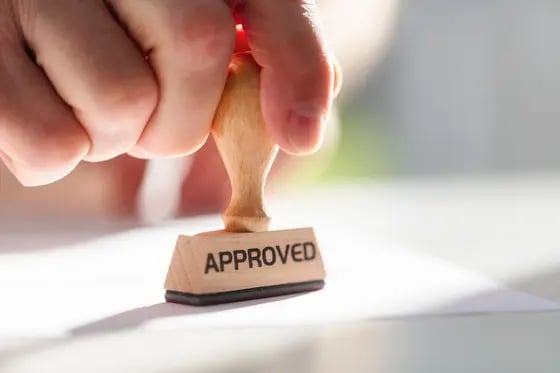The International Trade Blog Export Forms
Export Document Legalization: Understanding the Requirements
On: April 24, 2024 | By:  David Noah |
4 min. read
David Noah |
4 min. read
 As an exporter, ensuring your documents are recognized and accepted by the destination country is crucial. This can sometimes involve a process called "legalization," which verifies the authenticity of your commercial and legal documents issued in the United States. Here, we'll break down the different methods, requirements and how you can streamline this process for smoother exports.
As an exporter, ensuring your documents are recognized and accepted by the destination country is crucial. This can sometimes involve a process called "legalization," which verifies the authenticity of your commercial and legal documents issued in the United States. Here, we'll break down the different methods, requirements and how you can streamline this process for smoother exports.
What Is Document Legalization?
Legalization is a formal process to legally recognize commercial and legal documents from the United States. It assures the receiving country that the documents are genuine. This can be done at an embassy or consulate in the U.S. or by using an Apostille, which is authentication of the documents by the State Department or a state's Secretary of State office.
Why Use an Apostille?
The Apostille process is easier and cheaper than the legalization process through an embassy, and the Hague Apostille Convention replaces the need for the legalization process in the 125 countries that have ratified that convention. Here are the Apostille requirements.
The Difference Between Legalization and an Apostille
- Scope: Legalization is used for documents going to non-Hague Convention countries, while Apostilles are for Hague Convention member countries.
- Issuing Authority: Legalization is done by the relevant embassy or consulate, while Apostilles are issued by a designated authority within the U.S. (usually the Secretary of State's office or a state equivalent).
- Cost and Speed: Apostilles are generally faster and cheaper to obtain than traditional embassy legalization.
What Documents Typically Need Legalization?
Most common export documents, such as certificates of origin and commercial invoices, typically do not require legalization. However, legalization may be needed for some corporate and legal documents, including a certificate of free sale, and federally issued documents such as those issued by the U.S. Food and Drug Administration and the Patent and Trademark office. You'll find a country-by-country list of these requirements here.
Certificates of Origin Stamped by a Chamber
In most cases, if a country requires a certificate of origin it can be stamped by a chamber of commerce in the country of export. These documents are "chamberized" by the chamber's stamp. They do not usually need to be notarized. The International Chamber of Commerce (ICC), which is the organization that governs certificates of origin requirements, is encouraging exporters to move from a paper certificate to an electronic certificate of origin (eCO). An eCO helps ensure the validity of the certificate because it not only adds a chamber's seal to the document, it is registered with the ICC, so customs authorities around the world can confirm the authenticity of the document. You can quickly and easily get an eCO stamped by a chamber here.
Challenging Unnecessary Legalization Requests
While it is not usually required, sometimes a country's customs authority will ask that the exporter have a chamber stamp additional documents like the commercial invoice and other documents like a packing list. An exporter should always work with their foreign buyer and foreign agent to confirm what documents are required, what information is needed on those documents, and who will prepare them. Depending on how an exporter will get paid for their goods, they may also need to include their bank in these discussions to ensure they satisfy those requirements.
Sometimes exporters get requests for non-standard export forms or for unusual information or certification on the export paperwork that are outside the normal scope of export documentation, including the use of a corporate seal. While some of these requests may be legitimate, we usually counsel exporters who get these special requests to ask the importer or the importer’s agent for links to the regulatory requirement for these unique forms, data or certifications. More often than not, they reflect an outdated business practice that has been passed down over time without a reexamination of the requirement.
Determine What Documents Are Required for Your Export
Understanding the difference between legalization and Apostilles, along with knowing when these processes are truly necessary, can save exporters time and money. Another way: Shipping Solutions export documentation and compliance software.
With Shipping Solutions, you can complete accurate export documents up to five-times faster and improve the accuracy of your export paperwork—inconsistent documents can cause big headaches. The Export Compliance Module includes document determination to help you understand what documents you need to create and include with your shipment based on customs regulations in the U.S. and the destination country.
We’d love to show you how it works. Click here to sign up for a free demo. No obligation!
Like what you read? Subscribe today to the International Trade Blog to get the latest news and tips for exporters and importers delivered to your inbox.

About the Author: David Noah
As president of Shipping Solutions, I've helped thousands of exporters more efficiently create accurate export documents and stay compliant with import-export regulations. Our Shipping Solutions software eliminates redundant data entry, which allows you to create your export paperwork up to five-times faster than using templates and reduces the chances of making the types of errors that could slow down your shipments and make it more difficult to get paid. I frequently write and speak on export documentation, regulations and compliance issues.



